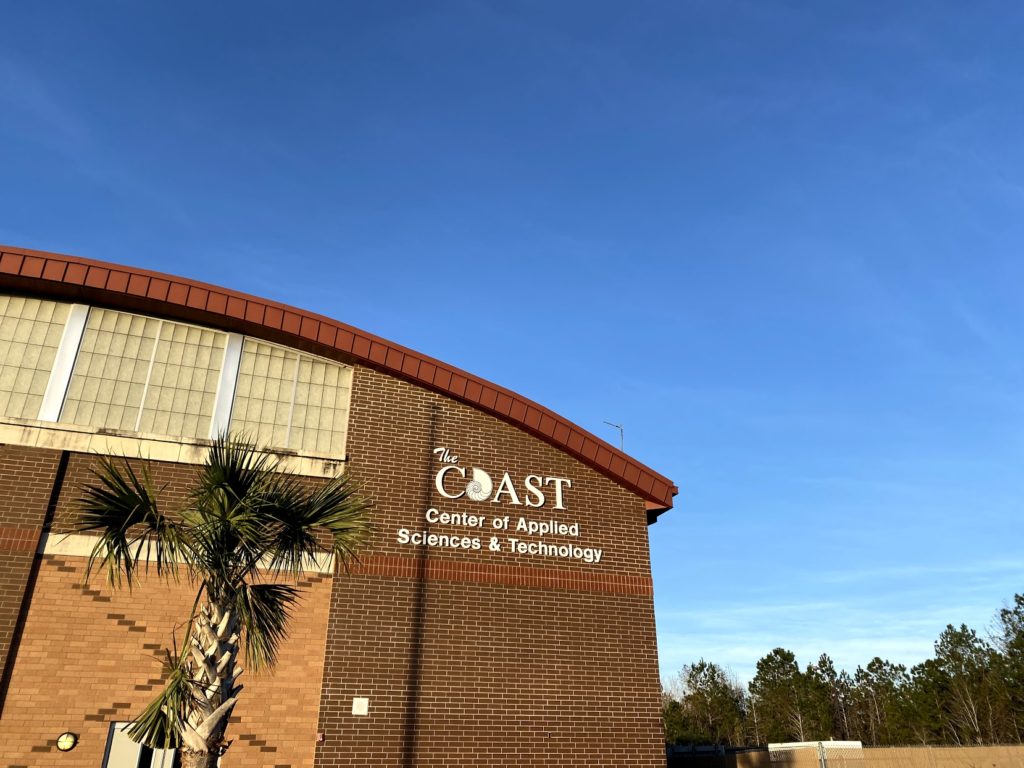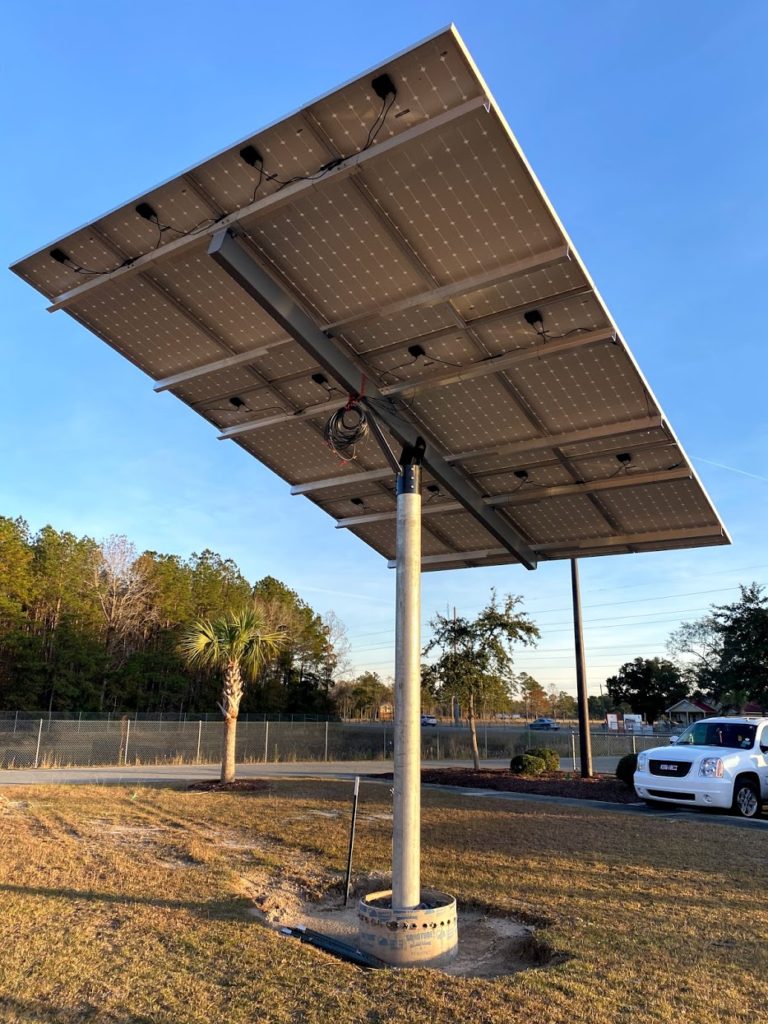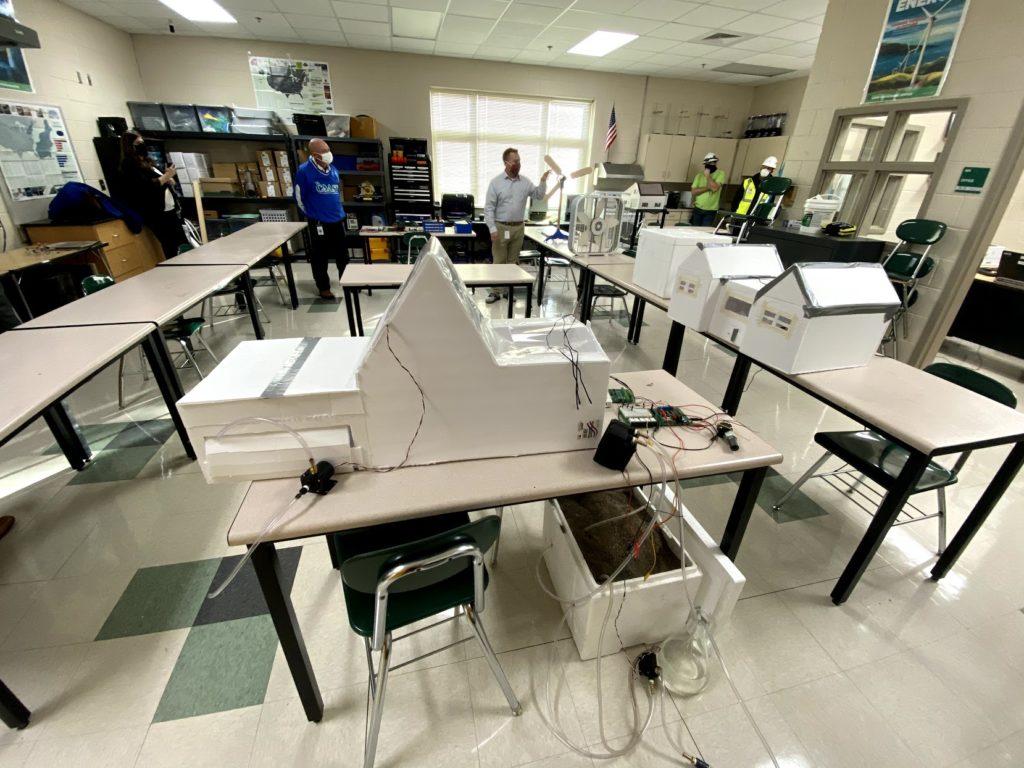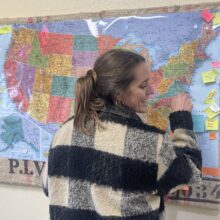Outside of The Center of Applied Sciences and Technology in Brunswick County, known as The COAST, there is an 18-foot solar panel system. The school received the system from the NC GreenPower Solar + Schools grant, which will be awarded to 15 schools next year.
The grant brings more than just energy to the building. It is an invaluable resource for the school, as it also comes with curriculum materials, training, and monitoring equipment says Dr. Daniel Richardson, clean energy program instructor at The COAST.


The COAST in Brunswick County. Caroline Parker/EducationNC 

Solar PV outside The COAST. Caroline Parker/EducationNC
The COAST offers STEM and technical classes for all high school students in Brunswick County. The building once housed the district’s alternative school, but made the transition four years ago to become The COAST. Along with STEM magnet programs, the campus also hosts the Ninth Grade Academy, which offers smaller class sizes and more support for students who are identified as higher risk for not graduating high school.
When we walked into the clean energy classroom at The COAST, Richardson had a set of student-constructed, scaled geothermal houses and a wind turbine unit. These were projects from students in the first and second semester courses of clean energy. If this is what they are learning in their introductory classes, what do they learn as they progress?


In the first course, students go into electric motors, learning how to optimize them and get them to run. They study solar photovoltaic technology, passive solar water heating, biodiesel, and wind. In the second course, they look at nuclear power batteries, geothermal energy, environmentally-friendly fleet vehicles, and bio gas.
“We work with students to design and engineer energy systems that are non-polluting.”
Daniel Richardson, clean energy instructor at The COAST
In the third course, students are really put to work — they do an energy audit on The COAST building itself. In the end, they give recommendations to leadership on how the school could be more energy efficient. The goal, once the COVID-19 pandemic has subsided, is to get these students into other school district buildings for energy audits. They also study pyrolytic stoves and dive into energy storage.
The fourth and final course is one that Richardson just finished his training on. His hope is once students reach this semester, they will be able to select a passion project and dive even deeper into their favorite element of clean energy.
At the core of the clean energy program is a focus on engineering. With so much of the work being hands on, a by-product of the program is a small amount of construction skills. The goal with this class, as with so many others at The COAST, is to help get students ready for cutting-edge industries and available jobs.
We asked Richardson to tell us more about the clean energy program and what he sees as the future for his students. The interview below has been edited for length and clarity.
Parker: How important do you think the role of STEM is in school now?
Richardson: STEM is the thing that brings the content that we try to teach students and connects it to the real world. When you think about STEM, you often think about science and math classes, but we’re really taking a hard angle from a career technical standpoint because that’s where the STEM skills utilized.
We see that in STEM education, engineering is often the piece that’s not quite as refined as we would like it to be. We have science classes and we have math classes, we have technology classes, but it’s that “E” in the middle of STEM that glues everything together, it’s the application.
Parker: What are you most excited about for the future of the clean energy program?
Richardson: The thing I’m most excited about with the clean energy program and The COAST as a whole, is just reaching as many students as we can and connecting them with a way of learning that’s engaging and exciting and fun, but also rigorous and in-depth and connected across multiple curriculum content areas.
I am really excited that what we’re doing here at The COAST allows access to these courses by any student in the district, we’re not isolating them to one high school, where if you’re not going to the high school you can take that course. I feel like what we’re doing is changing the approachability to these types of specialized courses.
They are going to draw a certain types of students with certain interests. It’s opening it up to them where they’re not limited geographically, and there’s a lot of support in place to make sure that they have access to these courses.
Parker: What do you think is the single most important skill a teacher can have to make them effective?
Richardson: I believe the biggest quality that a teacher needs to be successful is they have to develop relationships with their students. They’ve got to be able to read the room and adjust on the fly.
Every group, every student is different, and has different needs. And I feel like the teachers that are most effective are the ones that are skilled at knowing how to approach those students, how to give those students what they need, when they need it in a way that makes that learning process more attainable, and significant to that student.
Parker: If there was one thing you’d want people to know about The COAST or your program, what would that be?
Richardson: The biggest thing that I want people to understand about what we’re doing at The COAST is that our purpose is to connect students with industries that are here in Brunswick County.
The idea is that these are talented people, this is the next generation of our community, and our support system, and our infrastructure. So our goal is to connect those students with the careers and jobs that are available for them right here where they live.
Editor’s note: This previous version of this piece incorrectly stated that the solar grant was provided from NC Power and that it was given to five schools. The organization’s name is NC GreenPower and the grant will be given to 15 schools next year.


